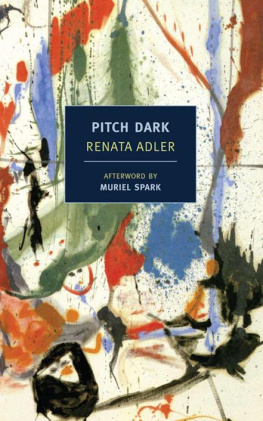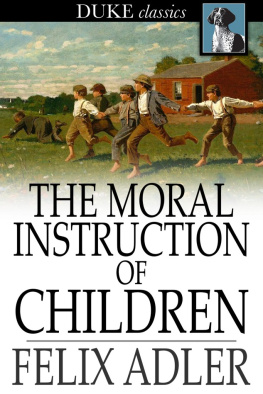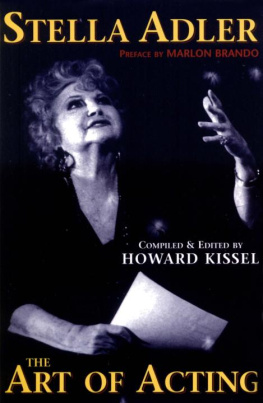Renata Adler - Pitch Dark
Here you can read online Renata Adler - Pitch Dark full text of the book (entire story) in english for free. Download pdf and epub, get meaning, cover and reviews about this ebook. genre: Detective and thriller. Description of the work, (preface) as well as reviews are available. Best literature library LitArk.com created for fans of good reading and offers a wide selection of genres:
Romance novel
Science fiction
Adventure
Detective
Science
History
Home and family
Prose
Art
Politics
Computer
Non-fiction
Religion
Business
Children
Humor
Choose a favorite category and find really read worthwhile books. Enjoy immersion in the world of imagination, feel the emotions of the characters or learn something new for yourself, make an fascinating discovery.
- Book:Pitch Dark
- Author:
- Genre:
- Rating:3 / 5
- Favourites:Add to favourites
- Your mark:
- 60
- 1
- 2
- 3
- 4
- 5
Pitch Dark: summary, description and annotation
We offer to read an annotation, description, summary or preface (depends on what the author of the book "Pitch Dark" wrote himself). If you haven't found the necessary information about the book — write in the comments, we will try to find it.
Pitch Dark — read online for free the complete book (whole text) full work
Below is the text of the book, divided by pages. System saving the place of the last page read, allows you to conveniently read the book "Pitch Dark" online for free, without having to search again every time where you left off. Put a bookmark, and you can go to the page where you finished reading at any time.
Font size:
Interval:
Bookmark:
RENATA ADLER was born in Milan and raised in Connecticut. She received a B.A. from Bryn Mawr, an M.A. from Harvard, a D.dE.S. from the Sorbonne, a J.D. from Yale Law School, and an LL.D. (honorary) from Georgetown. Adler became a staff writer at The New Yorker in 1962 and, except for a year as the chief film critic of The New York Times, remained at The New Yorker for the next four decades. Her books include A Year in the Dark (1969); Toward a Radical Middle (1970); Reckless Disregard: Westmoreland v. CBS et al., Sharon v. Time (1986); Canaries in the Mineshaft (2001); Gone: The Last Days of The New Yorker (1999); Irreparable Harm: The U.S. Supreme Court and The Decision That Made George W. Bush President (2004); and the novels Speedboat (1976; winner of the Ernest Hemingway Award for Best First Novel) and Pitch Dark (1983).
MURIEL SPARK (19182006) was a Scottish novelist and poet. Among the best known of her twenty-two novels are The Prime of Miss Jean Brodie, The Girls of Slender Means, Memento Mori, and Loitering with Intent. In 1993 she was made Dame Commander of the Order of the British Empire.
PITCH DARK
RENATA ADLER
Afterword by
MURIEL SPARK
NEW YORK REVIEW BOOKS

New York
THIS IS A NEW YORK REVIEW BOOK
PUBLISHED BY THE NEW YORK REVIEW OF BOOKS
435 Hudson Street, New York, NY 10014
www.nyrb.com
Copyright 1983 by Renata Adler
Afterword 1983 by Muriel Spark
All rights reserved.
Cover image: Helen Frankenthaler, Las Mayas (detail), 1958; 2013 by the Estate of Helen Frankenthaler / Artists Rights Society (ARS), NY
Cover design: Katy Homans
The Library of Congress has cataloged the earlier printing as follows:
Adler, Renata.
Pitch dark / by Renata Adler ; afterword by Muriel Spark.
pages cm. (New York Review Books classics)
ISBN 978-1-59017-614-6 (pbk.)
1. Women travelersFiction. I. Title.
PS3551.D63P5 2013
813'.54dc23
2012044053
eISBN 978-1-59017-634-4
v1.0
For a complete list of books in the NYRB Classics series, visit www.nyrb.com or write to:
Catalog Requests, NYRB, 435 Hudson Street, New York, NY 10014
For B.
WE WERE running flat out. The opening was dazzling. The middle was dazzling. The ending was dazzling. It was like a steeplechase composed entirely of hurdles.
But that would not be a steeplechase at all. It would be more like a steep, steep climb.
They were shouting, Tell it, big momma, tell it. I mean, the child is only six years old.
Do I need to stylize it, then, or can I tell it as it was?
He knew that she had left him when she began to smoke again.
Look here, you know, I loved you.
I wonder whether he will ever ask himself, say to himself, Well, she wasnt asking all the earth, why did I let her go?
My back went up, Viola Teagarden used to say, with a little thrill of self-importance, pride and pleasure, head raised, nostrils flaring, back straightening slightly, as though she had received a small electric charge right through her chair. My back went up. She also spoke with a kind of awe of what she called my anger, as though it were a living, prized possession, a thoroughbred bull, for instance, to be used at stud, or as a man who has married a beautiful, unpredictably unpleasant woman, far richer and younger than himself, might say my wife. Leander Dworkin, too, though he hardly knew Viola and in fact despised her, had what he called my rage. It resembled, sometimes a hothouse of imaginary grievances under lavish cultivation, sometimes a pulse which he measured constantly to see whether, with whom, and to what degree he must be angry, sometimes a source of astonishment and pleasure, sometimes just a horse to be taken for a canter or a gallop on the moors. In times of rage, he wanted nothing to distract or mollify him. Even flattery, for which his appetite was otherwise undiscriminating and enormous, would infuriate him on his way to an apotheosis. A few people humored him in this. They were his friends. Inevitably, it was with one or more of these few friends that he was angrya source, at first, always of distress, since he broke off with words as harsh as they were capricious, and then, for the long quiet interval that followed, of relief.
To begin with, I almost went, alone, to Graham Island.
He thought of himself, even spoke of himself, as extraordinarily handsome. His hair, which grew to collar length, was reddish. His hairline was receding; his eyes, which blinked constantly over his contact lenses, were the palest blue. Though he was by no means a strikingly ugly man, the source of his belief in his physical beauty seemed to lie in this: that he was tall. Leander Dworkin was the amplifying poet. Willie Stokes was the poet of compression. Both taught poetry, and wrote novels, when we were in graduate school. We met in two improbable seminars, taught by great men. Notions of Paradise, and Sound in Literature. The first was literary Utopias, essentially; the second, onomatopoeia. Both were so crowded at the start that students had to be selected on the basis of some claim of special knowledge. In Paradise, that year, we had one grandson of Oneida, one nun, one believer in the Skinner box, some students of Rousseau, the Constitution, Faust and Plato, and one participant in experiments with a new drug, psylocybin, under the guidance of Leary and Alpert, two young instructors in psychology. In Sound, I remember just one specialist, a pale, dark-haired Latin scholar, who rocked continuously in his chair whenever he read us onomatopoetic phrases he had found among the classics. The murmuring of innumerable bees in immemorial elms; linsecte nette gratte la secheresse. Fairly late in the semester, when we were asked what our papers were going to be about, this young man said he wanted to write about the sound of corpses floating through literature. Oh, the professor said, with some enthusiasm, after just a moments hesitation, you mean Ophelia. No, the young man replied, I want the sound of the sea.
To begin with, I almost went, instead, to Graham Island.
For a woman, it is always, dont you see, Scheherazade.
In nineteen sixty-four, the dean announced to the trustees that, for all intents and purposesmeetings, sleep, meals, electricity, demands upon her time and one anothersthe students had abolished night.
Brahms, he said, in explaining to a colleague why he did not attend that autumns campus concert series. All of it was Brahms. All, every. Eight. Things. Of Brahms.
Though he was my friend, I did not see Leander Dworkin often. We found that our friendship was safer on the telephone. Sometimes we spoke daily. Sometimes we did not speak for a year or more. But the bond between us, I think, was less stormy, and in some ways more intense, than Leanders relations with people he actually saw. Once every few years, we would have dinner together, or a drink, or just a visit. Sometimes alone, more rarely with someone with whom he was living and whom he wanted me to meet. One night, when we had gone, I think, off campus for hamburgers, I noticed, on Leanders wrist, several thin, brown, frayed and separating strands, like a tattered cuff of rope. Leander said it was an elephant-hair bracelet, and that Simon, his lover, had given it to him. It was frayed because he always forgot to remove it, as he ought to, before taking showers. Elephant hairs, it seems, are talismanic. It was going to bring him luck. Elephant-hair bracelets are expensive; they are paid for by the strand. In the following year, Leander wrote many poems, and at last received his tenure. When we met again, months later, the frayed strands were gone. In their place was a thin, round, sturdy band of gold, which encased, Leander said, a single elephant hair. When I asked what had happened to the old bracelet, he said, I lost it, I think. Or I threw it out. For some time, Leander had spoken, on the phone, of a woman, a painter, whom he had met, one afternoon, outside the gym, and whom he was trying to introduce, along with Simon, into his apartment and his life. The woman was in love with him, he said. She was married to a real-estate tycoon. Her name was Leonore. He was anxious for me to meet her. I knew that, in addition to his appetite for quarrels, Leander likes triads, complications, any variant of being paid for. But I looked at the bracelet, and I thought of Simon, and I thought, Leonore plays rough.
Next pageFont size:
Interval:
Bookmark:
Similar books «Pitch Dark»
Look at similar books to Pitch Dark. We have selected literature similar in name and meaning in the hope of providing readers with more options to find new, interesting, not yet read works.
Discussion, reviews of the book Pitch Dark and just readers' own opinions. Leave your comments, write what you think about the work, its meaning or the main characters. Specify what exactly you liked and what you didn't like, and why you think so.












![Becky Doughty [Unknown] - Renata and the Fall from Grace](/uploads/posts/book/140017/thumbs/becky-doughty-unknown-renata-and-the-fall-from.jpg)
